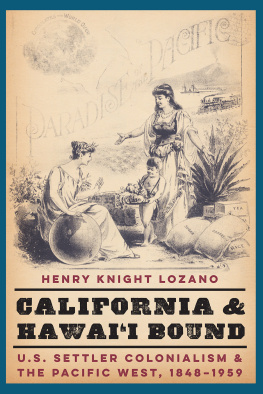
Education and the Racial Dynamics of Settler Colonialism in Early America
This is one of the first historical monographs to demonstrate the settler colonial paradigms significance for Early American historical studies. Based on a nuanced reading of the archive, the book treats settler colonialism as a process rather than a coherent ideology. Spady shows that learning was a central site of a colonial struggle in which Native Americans, Africans, and European settlers acquired and exploited each others knowledge and practices. Skills, attitudes, and ideas learned under settler-colonization shaped the economy and culture of the region. The colonized sometimes learned new ways to challenge colonial authority. Factions of African and Native American communities devised new survival and resistance strategies. White settlers gradually responded with a three-part pattern of racialization: settlers tried to prohibit literacy for the enslaved, eliminate Indigenous communities, and initiate some of North Americas earliest schools for poorer whites. Fully instituted by the end of the 1820s, settler colonizations racialization of learning in the South endured beyond the Civil War and Reconstruction.
James ONeil Spady is an associate professor of American History at Soka University of America in Aliso Viejo, California.
Routledge Advances in American History
The Conservative Movement and the Vietnam War
The Other Side of Vietnam
Seth Offenbach
The Liberal Dilemma
The Pragmatic Tradition in the Age of McCarthyism
Jonathan Michaels
Reagans Boys and the Children of the Greatest Generation
U.S. World War II Memory, 1984 and Beyond
Jonathan M. Bullinger
Perceptions of China and White House Decision-Making, 19411963
Spears of Promise, Shields of Truth
Adam S.R. Bartley
A Brief History of the Subordination of African Americans in the U.S.
Of Handcuffs and Bootstraps
Alexander Polikoff and Elizabeth Lassar
Education and the Racial Dynamics of Settler Colonialism in Early America
Georgia and South Carolina, ca. 1700ca. 1820
James ONeil Spady
The Overseers of Early American Slavery
Supervisors, Enslaved Labourers, and the Plantation Enterprise
Laura R. Sandy
For more information about this series, please visit: www.routledge.com/Routledge-Advances-in-American-History/book-series/RAAH
Education and the Racial Dynamics of Settler Colonialism in Early America
Georgia and South Carolina, ca. 1700ca. 1820
James ONeil Spady
First published 2020
by Routledge
52 Vanderbilt Avenue, New York, NY 10017
and by Routledge
2 Park Square, Milton Park, Abingdon, Oxon, OX14 4RN
Routledge is an imprint of the Taylor & Francis Group, an informa business
2020 Taylor & Francis
The right of James ONeil Spady to be identified as author of this work has been asserted in accordance with sections 77 and 78 of the Copyright, Designs and Patents Act 1988.
All rights reserved. No part of this book may be reprinted or reproduced or utilised in any form or by any electronic, mechanical, or other means, now known or hereafter invented, including photocopying and recording, or in any information storage or retrieval system, without permission in writing from the publishers.
Trademark notice: Product or corporate names may be trademarks or registered trademarks, and are used only for identification and explanation without intent to infringe.
Library of Congress Cataloging-in-Publication Data
Names: Spady, James ONeil, 1968 author.
Title: Education and the racial dynamics of settler colonialism in early America : Georgia and South Carolina, ca. 1700ca. 1820 / James ONeil Spady.
Other titles: Routledge advances in American history ; 16.
Description: New York, NY : Routledge, 2020. | Series: Routledge advances in American history; 16 | Includes bibliographical references and index.
Identifiers: LCCN 2019054388 (print) | LCCN 2019054389 (ebook) | ISBN 9780367437169 (hardback) | ISBN 9781003005247 (ebook) | ISBN 9781000047318 (adobe pdf) | ISBN 9781000047325 (mobi) | ISBN 9781000047332 (epub)
Subjects: LCSH: WhitesGeorgiaRelations with IndiansHistory. | WhitesSouth CarolinaRelations with IndiansHistory. | SlavesEducationGeorgiaHistory. | SlavesEducationSouth CarolinaHistory. | Racism in educationGeorgiaHistory. | Racism in educationSouth CarolinaHistory. | GeorgiaRace relationsHistory. | South CarolinaRace relationsHistory.
Classification: LCC F295.A1 S69 2020 (print) | LCC F295.A1 (ebook) | DDC 305.8009758dc23
LC record available at https://lccn.loc.gov/2019054388
LC ebook record available at https://lccn.loc.gov/2019054389
ISBN: 978-0-367-43716-9 (hbk)
ISBN: 978-1-003-00524-7 (ebk)
Typeset in Sabon
by Apex CoVantage, LLC
Contents
PART I
Colonization and Learning to Circa 1770
PART II
Colonization and Learning After Circa 1770
Guide
Writing a book incurs many debts to people and institutions. Completing the process offers the chance to express thanks and give credit. I thank the numerous librarians, scholars, and colleagues at the South Carolina Department of Archives and History, the College of Charleston, University of South Carolina, the South Carolina Historical Society, the South Caroliniana Library, the Hargrett Reading Room at the University of Georgia, Duke University Special Collections, the Southern Historical Collection at the University of North Carolina, the New York Public Library, the University of Southern Californias American Origins series, the Huntington Library, the College of William and Mary, and the Omohundro Institute of Early American History and Culture. I thank my friends and comrades in the Tidewater Labor Support Committee, Chicanxs Unidxs, and the United Electrical Workers Local 160.
Many conference commenters, peer reviewers, and editors responded to various portions and iterations of this work over the years. I hope they will see how their criticisms and suggestions improved the work. Soka University of America provided significant research and travel funding, and my colleagues supported the development of relevant seminars. A few specific people read drafts and without them this book would possibly never have been complete: Robert A. Gross, Peter Mancall, Leisa Meyer, Andrew Newman, Bill Pencak, Terri Snyder, Frederika Teute, and Karin Wulf. It is a pleasure to acknowledge Soka colleagues who advised me: Shane Barter, Esther Chang, Sarah England, Jay Heffron, Dongyoun Hwang, Orin Kirshner, Ian Read, and Michael Weiner. Several colleagues in the SMR reading and discussion group at Soka were especially important: Ryan Caldwell, Tomas Crowder-Taraborrelli, Aneil Rallin, and Kristi Wilson. I also want to acknowledge Alex Scott and Khin Thazin, research assistants who contributed most significantly to the completion of this manuscript. Many other students contributed directly and indirectly to this work, most of them without knowing it, I imagine. I cannot name them all here, but I am grateful to each. Teaching is also inquiry, and teachers learn from students.













